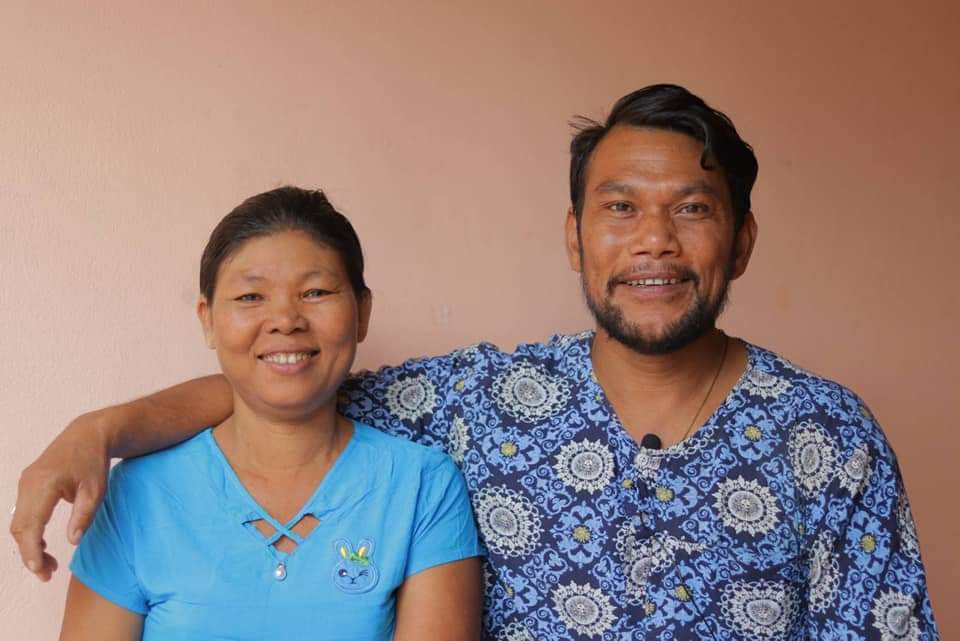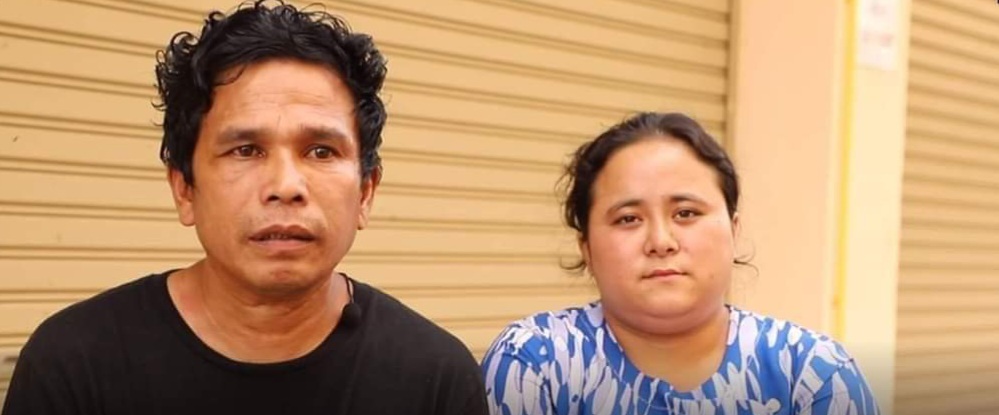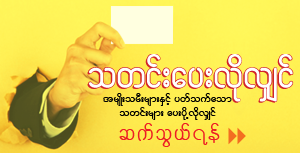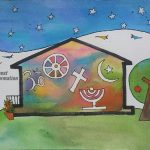Who enlightened by their better halves
Khin Bhone Moh
Once the dawn broke, a woman was busy preparing breakfast for her family. While humming songs, her husband was washing his face. Afterward, their children got up and had breakfast together. Today’s breakfast was one of the family reunion times presented to all family members after some time. In the past, they didn’t have the chance to gather like this, as they rarely saw each other.
The woman is glad that all family members can wake up calmly to start new days and stay peacefully in the liberated area. She is Daw Ohn Htwe, the wife of deputy sergeant Kyaw Naing Soe.
After the military coup, civil servants joined the Civil Disobedience Movement (CDM) in masse earnestly. Civil servants as well as soldiers sided with CDM and the people. Over a year after the coup d’état, deserters, along with arms from the army, police, and some of their families, joined CDM.
According to the annual report released by the shadow, National Unity Government (NUG) on April 17, 2022, the number of people who joined CDM from the army and police sectors is currently over 10,000.
The role of wives next to their husbands in the CDM route is also crucial. Daw Ohn Htwe, aged 53, is a dutiful wife of a soldier as she can guide her better half to side with the public.
After their marriage, she came along with him to live in the barracks and tolerantly carried out all the activities of soldiers’ wives that they had to do.
There was nothing to be happy about for her during the entire period of staying in the army. When her husband had to go to the front line, she had to worry about him, and as they could not make ends meet with her husband’s salary, she had to sell groceries, even getting a heart attack because of the pressure.
“I am sick of them mostly, and they were stressful ones.” “As I had been suffering from depression at that time, I had to be hospitalized frequently and then got a heart attack and hypertension, too,” Daw Ohn Htwe revealed.
After living in the army for 17 years, they moved out of the army.
Before the coup, she took pride in being the soldier’s wife and being taken care of by the surrounding. If her husband went to the frontline, some neighbors bought her food, gave her some dried goods to cook with, and helped her buy some medicine for herself, so all of her surroundings loved her.
Due to the scanty salary her husband had to make ends meet, she tried to tackle those problems by selling groceries and massaging what she had learned.
After the military grasped the power, she could not sell groceries anymore and moreover, she came across hatred from the neighbors.
“I could go with the head-up position because I was the soldier’s wife in those days. But now, we had to go head down in a quiet manner as we were in total contempt and remained silent, even being spat upon,” shared her experience after the coup.
Her husband had to go frontline continuously, and then, in a fight, he returned with injuries. Despite his injuries, another duty was to go to the frontline again, so they thought of joining CDM. She also encouraged her husband to take part in CDM.
Even though they thought of joining CDM in the early period of the coup, it did not come about as they didn’t have any contact to do so. Her husband left the army and started working for CDM in July 2022.
When the news of her spouse’s joining the CDM spread, they were afraid of the danger of the army, so they sold out their estate and building at the asking prices, and then the whole family ran away.
Daw Ohn Htwe paid off some of her debts, which she borrowed during the hard times when they lived outside of the barracks, yet she had failed to do so. However, she thought of settling those debts someday, from somewhere.
“I don’t want to be caught in the hands of the army. We could not guess their attitude if we fell into their hands. We may be killed for telling others that we are detained. So we could not fall into the hands of the army and run away,” continued Daw Ohn Htwe.
Meanwhile, they run into some hardships like other runaway political activists. When the military vehicles passed near their hiding place, they were frightened of being arrested, so they could not eat meals calmly. At last, they made up their mind to go after her spouse.
They could stay peacefully with all their family members after reaching the safe zone.
“Here we have peace of mind and a chance to calm down,” she added.
Likewise, sergeant Than Naing Oo’s wife, Ma Sandi Vee Hlaing’s family, who deserted the Army, joined the CDM.
Ma Sandi Vee Hlaing, aged 22, met with her destined spouse, soldier Than Naing Oo, and got married, then stayed in the barracks. During her stay in the army, she didn’t refuse to do anything that was asked of her by the wives of her husband’s seniors. Even at mealtime, she had to carry out their tasks. Later, she decided to move out of the army barracks as her gastric ulcer became worse.
“I felt no pleasure at all in the army. But I endured the suffering. I heard that my husband was punched, then he was scolded, and another was that he was also scolded because of my mistakes. So, he had been hit. “I didn’t feel happy at all,” she said.
She had to sell something online since her spouse’s salary was meager.
In the past, as she was the wife of a soldier, she was favored in her surroundings and happy in those days.

People from her neighborhood used to bring her food when her husband went to the frontline. When she planned to send some food to her husband, some gave her pickled tea leaves, fried peas, and jaggery. After the coup, the actions of her neighbors totally changed.
We are abused in our ward. “Your hubby went to kill people,” people in the ward said. My little daughter told them back — No, my dad went to cure his injuries. But the neighbors keep saying to my child that “Your father went to murder people”. “These kinds of degrading treatments were suffered so much,” she recounted.
Having a medical soldier, he went to the village to treat some people, and at such a time, we were worried and afraid of being killed or not.
Due to new regulations in the army, it was hard to live there after the coup. For the families living outside of the barracks, they were asked to report whether they plan for trips; if there were some demonstrations near their houses they had to inform back; if there were banging pots to show against the coup, those families had to inform them back too.
“I always say ‘yes’ to their words in front of them to show I agree with them. But I didn’t listen to them, “she said. Since the situations were tense, she urged her spouse to join CDM but failed then. Her husband faced some pressure from his seniors at that time.
Later, her husband made up his mind to join CDM. Thanks to being asked by his seniors to collect money when treating people in the village, being accused of communicating with resistance forces; and being asked for money from the villagers.
After her husband joined the CDM, she was interrogated and detained for a week without any chance to meet family members.
When she got home from detention, she demanded money from the army because her husband joined the CDM along with his weapon.
If they asked for money, the amount might be 50,000, 100,000, or even 150,000. So, she settled for nearly 1 million kyats. When they asked for 28 million kyats later, she said she could not afford that amount and didn’t want to pay that amount; that is why she decided and arranged to follow her husband.
“There was a bunch of trouble! On one hand, I had to seek money to pay for the army, and on the other hand, as my father was suffering from a stroke, I sold all our belongings one by one for the cost of medicine, and then all had been sold out, “she added.
When she saw checkpoints on the road, she worriedly passed them on her way to her husband. When she saw her better half, she felt relaxed and happy.
It is a great thrill for me when all the family members get together. “Only when I know he is not dead, I am walking on air,” Ma Sandi Vee Hlaing recounted.
She is thinking of getting a job, but whatever she gets in the current place where she has been, she would like to spend her life peacefully.
For a soldier to join CDM, “The encouragement of his wife and family plays a vital role”, said a responsible person of the People Soldiers’ Wives Group.
The People Soldiers’ Wives Group was formed by the wives of soldiers who joined CDM. Regarding the group, they are conducting some activities such as opening a dialogue with CDM family members, carrying out some campaigns, opening language courses for CDM soldiers and their family members, assisting with health matters, and instigating the wives of soldiers inside the army to join CDM.
“When a soldier consults his wife to join CDM, the idea of being rejected by his wife leads to hindrance. If she accepts it easily and all the aids are readily taken, it can bring about joining CDM, “added a responsible person of the People Soldiers’ Wives Group.
Those wives whose husbands joined CDM worked whatever they got, some joined in the revolution activities, and so on. They tried to live their lives.
A woman political activist remarked that their (the wives of soldiers and police) social lives are also difficult because the people from their community don’t accept those who are committing unjust acts. Families of soldiers and police face desperate worries daily, so they don’t want their husbands to suffer torture and don’t want them to do bad things, as they are life partners and have to consult whether they are good or bad.
“It was said that the wives and families of the soldiers told the soldiers and police not to commit any injustice daily. On one hand, before the coup, the military held power over soldiers, police, and civil servants. Therefore, staying in the army is much more repressive, and they would take refuge in a liberated place. Non-CDM can see that families affected by CDM can stay independent and with human dignity. They know that they can live with human dignity if they come out from under the unfair acts”, a political activist woman said.
In those past days, Daw Ohn Htwe always paid homage to Buddha, praying for her husband’s return alive from the frontline.
But her wish has now been changed. “I wish all the creatures to be peaceful,” Daw Ohn Htwe said.
- ဇွန်လအတွင်း ဆယ်ကျော်သက်တွေအပါအဝင် အမျိုးသမီး ၃၄ဦး စစ်ကောင်စီကြောင့်သေဆုံး - 10/07/2025
- တပြိုင်တည်း တိုက်ပွဲနှစ်ရပ် ဆင်နွဲနေရတဲ့ အမျိုးသမီးများ - 09/07/2025
- ဒို့အတွေး ဒို့အမြင် - 08/07/2025





